#that’s supposed to be a sign of kidney disease
Explore tagged Tumblr posts
Text
…
#i have had my cats since 2008 and i think this is finally the end for her#she is drinking so much water and she’s been meowing her weird little meow at night for me to turn the sink on#and let her drink running water#that’s supposed to be a sign of kidney disease#she’s going to the vet on sunday but I’m worried if she’ll make it that far#she can’t sit still for too long#i honestly don’t know what I’ll do when she’s gone#she was never really my cat but she became it out of necessity#my mom didn’t want to keep her after we became homeless and tried to give her away#and I didn’t think that was fair so I made it my mission to care for her and do all the things she deserved#making sure she was cared for became my motivation all those years ago to start a savings account and find a place of my own#it took so long but I finally did it in 2021 and now it feels like it’s too late#I wonder if she ever enjoyed being here with me#versus the years she was living with my husband’s family; they adore her so much and became cat people because of her#even now I’m crying thinking about it#my husband is sympathetic but it feels like he’s ready to let her go#this place will be so lonely without her little face
2 notes
·
View notes
Text
When am I going to learn to stop looking things up? I picked my cat up and his leg was wet so I smelt it (I’m sick so I can’t really smell) and it smelled a little like cat pee but not a lot. So I took him in the bathroom and cleaned his leg off. Anyway so I looked up ‘why did my cat pee himself?’ It said it could be anxiety or stress which is has, especially in the winter. He’s an inside/outside car and hates the cold.
Or it be more because he’s older (9) maybe his muscle are weaker, maybe it’s a sign of a health problem like UTI, kidney disease. Or maybe the litter box is dirty.
He’s had UTI’s before. 3 of them. 1 every year. But he got surgery for it maybe 2 years ago and hasn’t had it since. The first one was when he was 4, worst week of my life. He was at the vet for a week and almost didn’t make it. I didn’t think I’d survive without him. I had the worst separation anxiety before that but after that it was somewhat worse. My head kept telling me that I can’t be sad or he’ll get it again. I can’t hug his bed to comfort me or he’ll get it again. I hated sitting, standing, walking because my mind was telling that would hurt him.
I had this one nightmare where I was holding him and on my phone and I saw a post or something about him saying ‘r.i.p’ and I was confused because he was in my arms. I put my phone down and he had disappeared. I asked my mom and she cried and I didn’t believe her. Thet nightmare was just the start, those were before he got his first one. I haven’t had one since but they still haunt me.
Anyway (I say anyway a lot sorry), he hasn’t been constantly in the liter box trying to pee so he can pee. Maybe he saw a cat out the window and that and the cold weather made him pee maybe out of stress/anxiety/ and the need to mark his territory? Sometimes he’s scared to come in the basement unless someone comes with him, I mean I’m down here but I was in the bathroom. Maybe he got scared to come down? I mean it has to be stress/anxiety/nervousness right?
It couldn’t be anything else. He can’t get sick again. He’s been doing good for so long. He’s on special food for his bladder plus he has medicine to help him with his stress that he takes every night. Or maybe the window he’s sitting in was wet because it usually is in the winter and it was on the leg that was facing the window.
But that doesn’t really explain the wet spot on his cat tree that does spell like pee. I know that my family will take him to the vet and put as much money needed to help him get better but I’m finally getting happy this can’t happen to me. Fuck, every fucking time I feel so much better and not depressed something happens and sets me back. Am I even supposed to be happy? Does the universe just want me dead? My cat saved my life, I wouldn’t be here without him. And I’m not ready. I’m definitely overreacting I know but that’s what I do best. And he’s playful which he wouldn’t be if he felt horrible.
#diary#low self everything#dear diary#depressing shit#i hate my existence#tw depressing stuff#personal vent
1 note
·
View note
Text
Systemic lupus erythematosus (SLE): a complex autoimmune disease
What is systemic lupus erythematosus?
Systemic lupus erythematosus, often abbreviated to SLE, is a chronic autoimmune disease. This means that the immune system, which is supposed to protect the body against external aggression, turns against its own tissues. In the case of lupus, it attacks different parts of the body, causing inflammation.

What causes lupus?
The exact causes of lupus are not entirely known, but several factors seem to contribute to it:
- Genetic factors: some people have a genetic predisposition to developing the disease.
- Environmental factors: exposure to the sun, certain infections and certain medications can trigger the disease in predisposed individuals.
- Immune system dysfunction: excessive production of autoantibodies that attack the body's cells and tissues.
What are the symptoms?
The symptoms of lupus vary greatly and can affect many organs. The most common are
- Skin manifestations: ‘butterfly wing’ rash on the face, sun sensitivity, mouth ulcers.
- Joint pain: swelling, redness and pain in the joints, similar to arthritis.
- Fatigue: intense and persistent tiredness.
- Fever: often low grade but prolonged.
- Kidney problems: kidney damage may occur in severe forms of the disease.
- Heart problems: inflammation of the pericardium or heart valves.
- Neurological problems: headaches, convulsions, memory problems.
How is lupus diagnosed?
Diagnosing lupus is often complex because the symptoms can vary from one person to another and mimic other diseases. It is based on :
- Clinical examination: the doctor will look for the characteristic signs of the disease.
- Complementary examinations:
o Blood tests: to look for specific autoantibodies.
o Skin biopsy: to confirm characteristic skin inflammation.
o Ultrasound, MRI, CT scan: to assess involvement of other organs.
What are the treatments?
Lupus treatment aims to control inflammation, relieve symptoms and prevent complications. It may include :
- Medication: anti-inflammatory drugs, corticosteroids, immunosuppressants, and more recently biotherapies.
- Symptomatic treatments: to relieve joint pain, skin problems, etc.
How do you live with lupus?
Living with lupus requires comprehensive care and adaptation to the disease. It is important to :
- See a doctor regularly to monitor the progress of the disease.
- Adopt a healthy lifestyle: balanced diet, appropriate physical activity, stress management.
- Learn more about the disease to better understand and manage it.
- Join patient associations for psychological support and to talk to other people suffering from the same disease.
Go further
0 notes
Text
Kidney Failure Treatment Without Dialysis: A Guide to Alternative Medication for Treating Kidney Diseases
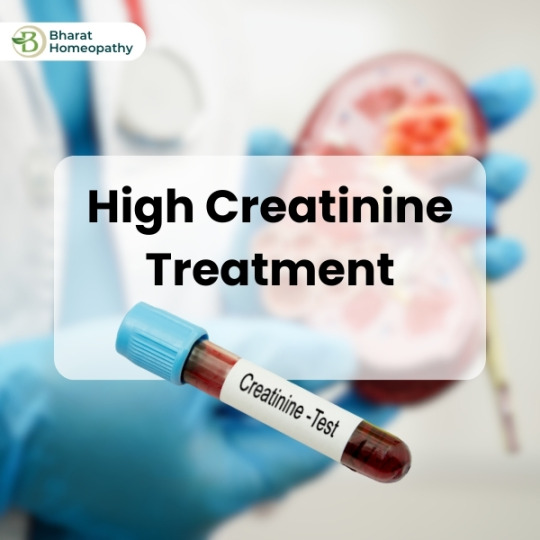
What is chronic kidney disease?
Kidney diseases, especially chronic kidney disease (CKD), are severe health problems in which the kidneys slowly stop eliminating excess liquids and waste from the blood. This condition may cause an accidental accumulation of wastes inside the body. This can create a myriad of health problems. Kidney disease can cause kidney failure. This is known as end-stage renal disease, in which kidneys no longer function in the way they are supposed to. If you don't get timely and effective Treatment for kidney failure, it could lead to life-threatening complications.
Understanding Kidney Disease
The kidneys are vital organs that filter fluids, ensuring electrolytes are in balance and ensuring overall fluid balance. Kidney disorders can be classified into two types:
An acute Kidney Injury (AKI): is an abrupt decline in kidney function. It can be reversed with the right treatment.
Chronic Kidney Disease (CKD): A progressive decline in kidney function over time, often leading to kidney failure.
CKD is more prevalent and is typically caused by issues like diabetes and high blood pressure, and also the condition known as glomerulonephritis (inflammation of the kidney's filtering unit). Other causes include genetic conditions, chronic incontinence of the urinary tract, and chronic kidney infections.
Complications of Kidney Disease
The kidneys with high blood pressure damaged kidneys are less effective at managing blood pressure, resulting in hypertension. Then, it can further harm the kidneys, which results in an endless cycle.
Anaemia: Kidneys that are healthy produce the hormone erythropoietin which increases the number of blood red cells. The damage to kidneys may reduce the amount of erythropoietin in the body, which can cause anaemia.
Bone Disease: Kidneys aid in controlling phosphate and calcium levels. In CKD, the balance gets disturbed, and the bones are weak, leading to an increased risk of fractures.
Fluid retention: Kidneys in decline are unable to eliminate excess fluid in the body, leading to swelling of ankles, legs, and hands. Swelling of the lungs also causes shortness of breath.
Elevated Creatinine levels: it's a waste product that is eliminated by the kidneys. Creatinine levels high in the blood indicate a decrease in kidney function. They are also utilised in order to determine the extent of kidney disease.
Kidney Failure Kidney Failure: One of the most severe consequences that could result from CKD is kidney disease, in which the kidneys are unable to function. Their capacity to function. The first sign of kidney failure is the need for immediate treatment, usually with dialysis or the transplantation of a kidney.
Homeopathy for Kidney Disease
Cure for chronic kidney disease is an all-natural and holistic type of treatment that can be considered an alternative or an alternative approach to treating kidney disease. The treatment aims to increase the body's ability to heal itself and restore the balance of the body without harsh kidney problem medication or harmful treatments.
Homeopathic Approach to Kidney Disease
An individualised treatment Approach The emphasis of homeopathy is on individualised treatment in response to the patient's unique symptoms along with medical history and general health. The doctor of homeopathy will take into consideration the emotional, physical and mental well-being of the patient before deciding on an appropriate recommendation for a remedy.
Natural remedies Homeopathic remedies originate from natural substances, including minerals or plants, as being animals. The remedies are made in extremely dilute forms, making them non-toxic and free from unwanted side effects.
The root is the root of the problem. Instead of treating symptoms, homeopathy attempts to address the root of the problem that causes kidney problems. For example, in the case of CKD caused by high blood pressure or diabetes the treatment of homeopathy is focused on reducing these conditions in order to prevent further damage to kidneys.
Enhancing Kidney Function Enhance Kidney Function with Homeopathic Treatments are commonly utilised to enhance kidney function and decrease inflammation. These remedies aid in eliminating poisonous substances, ease discomfort and improve urinary function.
Homeopathic remedies for reducing creatinine levels in patients with high creatinine help reduce creatinine levels by improving kidney functioning and aiding in elimination.
Preventing Kidney Failure with Homeopathy is a method of delaying the development of CKD and preventing damage to the kidneys by helping the kidneys regenerate and heal.
The Role of Homeopathy in Chronic Kidney Disease Treatment
Homeopathy is extremely useful as a complementary chronic kidney disease treatment in conjunction with conventional therapies. It may help alleviate symptoms, decrease the requirement for dialysis and increase the patient's quality of life.
Advantages of Homeopathy in CKD Treatment
The safe and non-invasive homeopathic remedies aren't harmful and free of negative side effects, which makes them an ideal choice for long-term usage.
Holistic Methodology: Homeopathy is a treatment for patients in a holistic way by addressing the emotional, physical and psychological aspects that are crucial in chronic diseases such as CKD.
Preventing kidney failure by controlling the root causes that lead to kidney issues and homeopathy might help stop or delay the onset of kidney failure.
Kidney failure treatment without dialysis based for patients looking at alternatives for dialysis can be the best choice since it is designed to improve the function of the kidney naturally.
Conclusion
Kidney problems are a significant issue that requires meticulous treatment to prevent complications, for example, high levels of creatinine, as well as cardiovascular disorders and kidney diseases. Although traditional treatment is important, homeopathy provides a holistic approach to high creatinine treatment that targets what is causing the problem and aids the body's process of healing. Through the integration of homeopathy into a treatment program, patients will benefit from improved kidney function and better treatment of their symptoms. They might even be able to avoid dialysis.
0 notes
Text
The Intersection of Palliative Care and Hospice: Clarifying the Differences

Palliative and hospice care both are types of elderly care to minimize the discomfort and pain of any chronic illness. Well, both have some differences in certain important ways.
If you or any of your aging loved ones are struggling with a serious disease, then it is important to opt for the right type of care as per the circumstances. But before that, it is crucial to have a clear understanding of each of these services and what they offer.
In this blog, you will get a fair idea of the key differences between palliative and hospice care-
Palliative Care:
In palliative care, a patient gets support to ease pain and associated health concerns if the disease is chronic but not considered life-threatening. It allows patients to live with the signs of several chronic diseases such as AIDS, cancer, and kidney diseases, or with the side effects of any past treatment plans.
Well, the medicines given in palliative care do not replace the existing treatments. It is considered an addition to help the patient and the caregivers deal with issues such as nerve pain, nausea, and shortness of breath.
If the patient's health is limiting him to work, getting around, playing, or even causing depression, palliative care can prove to be quite effective. In some cases, if the illness is supposed to be fatal, palliative care can allow the patient to live an active life as much as possible.
Hospice Care:
This is for the patients who are not expected to recover from their illnesses. Hospice Care is provided to the patient while helping the caregivers to get ready for the end of life. In hospice care, palliative care is usually provided initially but for a short time.
People receiving hospice care are expected to live only 6 months or less. They are still at their home, where caregivers and healthcare experts take care of them. Well, any specialized center nursing care home can also be selected for hospice care.
In such a type of senior care, all the family members, caregivers counselors, clergy, and social workers are involved apart from doctors and nurses. Hospice care provides ongoing care to the patient until his life ends.
How to choose between palliative or hospice care?
Generally, the decision to choose between palliative care and hospice care is dependent on the person's illnesses as well as the circumstances rather than the preferences of the family. For instance, a patient is eligible to take hospice care if they don't have any terminal issue or are taking a curative treatment for the same.
The person is eligible for palliative care if he-
Has a chronic disease with an uncertain trajectory
Is expected to live longer than 6 months
Is undergoing a curative treatment to treat the illness.
The person is eligible for hospice care if he-
Has a terminal health problem
Is expected to live not more than 6 months
Has stopped eating disease-directed treatment
Summarizing this, both palliative and hospice care assist the patients and their caregivers in dealing with many aspects including managing pain & discomfort, handling the conflict among the family, and sometimes resolving cultural and spiritual issues.
Deciding on choosing between palliative and hospice care can be overwhelming, especially when the patient is ill for a long time. Well, their healthcare professionals can guide the process and recommend the right care option. The palliative or hospice care provider also evaluates the condition and identifies which option is the best fit for the patient's requirements and ongoing treatment plans.
If you are also planning to opt for palliative care or hospice care for your loved one and seeking the best senior care home, then ProTribe can meet all your needs. They are the most trusted team of caregivers who make sure that your loved one gets all the necessary care and support in their last years. You can connect their team for nursing care homes, senior care, or even assisted living in Delhi, NCR.
This article was originally posted here - https://www.protribeseniors.com/the-intersection-of-palliative-care-and-hospice-clarifying-the-differences/
0 notes
Text
Causes and Solutions for Forgetting Frequently | Hinduja Hospital Blog
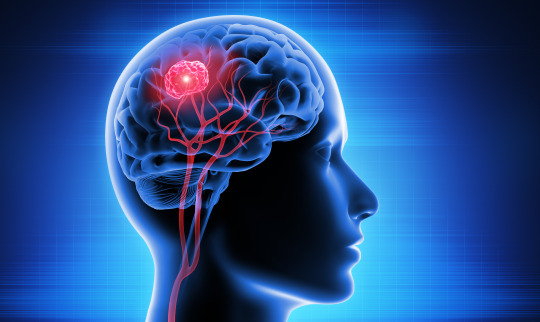
Forgetting Frequently
It's expected to occasionally forget things, and as one ages, it's acceptable to become a little more forgetful. But how much forgetting can be considered typical? How can one determine whether memory lapses are just a result of natural forgetfulness brought on by ageing or whether they are a sign of a more serious condition? At any age, healthy individuals might experience memory loss or memory distortion. Although some of these memory issues may worsen with age, these changes often indicate moderate forgetfulness, which tends to be a natural aspect of ageing rather than major memory issues.
What is natural memory loss and what is not?
What differentiates common, age-related forgetfulness from a major memory problem? While some memory loss is common as we get older, severe memory issues make it difficult to carry out daily tasks such as driving, using a phone, and finding the way home. Some individuals may find that learning new things takes longer than it used to, that they don't recall things as well as they used to, or that they frequently misplace things like their glasses. These are often symptoms of moderate forgetfulness rather than severe memory loss issues like Alzheimer's disease.
Differences between normal ageing and severe memory loss
Making incorrect decisions occasionally is a natural part of becoming older, but doing it frequently can be a sign of severe memory loss.
Normal forgetfulness includes forgetting what day it is and recalling it later, but forgetting the date or the time of year is not normal.
It's natural to occasionally miss an appropriate word, but having difficulty conversing is a major problem.
When you often lose items and can't seem to find them, it may be a sign of more significant memory loss than the occasional loss of things.
Causes of forgetfulness
Memory losses are troubling, annoying, and even frightening. They can make people fear that they are going to develop dementia or Alzheimer's if they occur more frequently than they should. But there are a few curable explanations for why people forget things.
The following are some common causes:
Perhaps the most common unrecognised cause of forgetfulness is not getting enough sleep. In addition to mood swings and anxiety, memory issues can result from not getting enough regular sleep.
Depression can show up as suffocating sadness, a lack of motivation, and less enjoyment of activities that you typically find enjoyable. Another symptom of depression, or one of its effects, is forgetfulness.
Memory issues can be caused by anything that makes it challenging to focus and retain new knowledge and abilities. The symptoms are stress and worry. Both have the ability to divert attention and prevent the forming of fresh memories or their recovery.
Even after the effects of alcohol have worn off, excessive alcohol use might cause problems with short-term memory.
Memory loss brought due to medical conditions
Serious problems with memory might be brought on by specific medical conditions. When a person receives treatment, these issues are supposed to go away. The following medical conditions can affect memory:
Brain tumours, blood clots, or infections.
Various thyroid, kidney, and liver conditions.
A brain injury brought on by a fall or other mishap.
Not eating enough nutritious food or having insufficient amounts of certain vitamins and minerals in the body, like vitamin B12.
Side effects of medication.
Memory loss brought on by psychological problems
A person may become more forgetful due to emotional issues like stress, worry, or sadness, which might be misinterpreted as dementia. For instance, someone who has recently retired or is adjusting to the loss of a spouse, family, or friend may feel depressed, lonely, anxious, or bored. Some people experience confusion or forgetfulness while attempting to cope with these life transitions. Usually, emotional disorientation and amnesia are temporary and disappear when the feelings subside. Friends and relatives who are willing to provide a hand can assist with emotional issues, but if they persist for more than two weeks, it's necessary to seek medical attention or counselling. Counselling, medicine, or a combination of both may be used as treatment. A person's mood may be lifted, and memory can be strengthened by staying active and picking up new skills.
Can the cause of forgetfulness be diagnosed using tests?
Your doctor can diagnose the root of your amnesia using a number of different methods. These consist of:
Blood testing to diagnose different diseases.
Neurological tests to assess speech, perceptions, spatial awareness, and reflexes.
Cognitive assessment, which includes memory, attention, and recall tests.
Magnetic Resonance Imaging (MRI) of the brain.
Psychometric testing to evaluate the effectiveness, efficiency, and calibre of mental processes.
Positron-emission tomography (PET) scan of the brain.
Treatment for forgetfulness
When discussing memory loss treatment or memory loss medication, it is important to consider some simple behavioural management strategies to assist in adjusting to these changes, particularly as short-term memory loss treatment:
Improve your nutrition and general fitness.
Reduce or manage stress more effectively.
Enhance sleep habits and consider recommending sleep medications if necessary.
Take dietary supplements, such as omega-3 fatty acids, that promote brain health.
Consider changing prescription drugs that may impair memory.
Treat diseases that haven't been diagnosed before.
Address any ongoing diseases that continue to cause cognitive issues.
Consider Cognitive Behavioral Therapy (CBT) as a form of therapy that aids in the recovery from head trauma.
Preventing memory loss and forgetfulness
For the health of the brain, a healthy lifestyle is crucial. You might be able to reduce memory loss and lessen forgetfulness by doing the following things:
Healthy eating - Promote the consumption of foods that protect the brain, such as fish, poultry, almonds, and green leafy vegetables, while discouraging the consumption of processed meals and foods high in sugar and saturated fat.
Exercise - Even low-impact exercises, such as daily 30-minute walks five days a week, might be beneficial.
Staying active cognitively - Try engaging in cognitively stimulating activities such as reading articles or books, exploring new places, solving puzzles, or picking up a new hobby.
Socialising - A lack of social support might result in despair and harmful stress. Strong relationships can help you feel better and minimise stress.
Treatment of Forgetfulness at Hinduja Hospital
The Hinduja Hospital offers state-of-the-art care for the treatment of dementia or Alzheimer's, making it the best facility for neurological, psychiatric, and neurosurgical therapies. The interdisciplinary team of highly qualified and experienced physicians, specialists, nurses, and assistants puts in a lot of effort to accurately identify and treatment of forgetfulness in Mumbai. The department provides a variety of imaging exams, including CT, MRI, PET, and neurosonology studies, to identify and treat brain problems. Once you arrive at our hospital, there is no need for you to be concerned since you will receive top-notch care without any inconvenience.
FAQs
Q1. What causes forgetting most frequently?
Ans. While there are numerous reasons why people forget things, sleep deprivation is a key factor. Changing your sleeping patterns could make you less forgetful.
Q2. When may forgetfulness be a cause for concern?
Ans. You should consult your healthcare practitioner if you often forget items you used to be able to recall, such as names or addresses. There is usually no need to worry if you periodically lose track of your keys or forget the reason you entered a place.
Q3. Is forgetfulness a permanent or temporary condition?
Ans. The memory loss might only last a short while before disappearing. Alternatively, it could persist and, based on the underlying reason, might worsen with time. Severe memory loss may make it difficult to carry out everyday tasks.
0 notes
Text
How To Manage Type 1 Diabetes
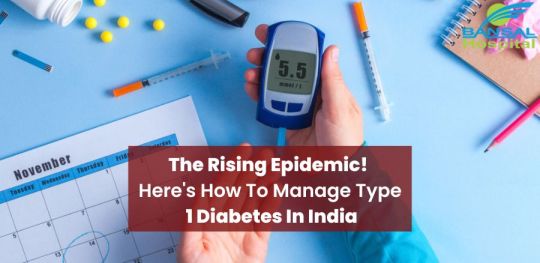
Diabetes is a disease that is well-known in India. Everyone in our social circle knows at least one person who has diabetes. Although it may seem commonplace, type 1 diabetes is a little different.
Type 1 Diabetes is a chronic condition. People with this form of diabetes have immune systems that attack body cells, particularly insulin-producing cells in the pancreas. Juvenile diabetes is another name for this kind, which affects kids and teenagers more frequently.
Do you also know this? The National Institutes of Health estimate that roughly 2.5 lakh people in India have type 1 diabetes, and 97,700 are children. One in six children reportedly passes away without a diagnosis.
What Is Type 1 Diabetes, Exactly?
You have probably witnessed many elderly people requesting that sugar not be added to their tea or coffee since their blood sugar level is high. But type 1 diabetes encompasses a considerably wider range of symptoms.
People with an inherent predisposition are more likely to develop type 1 diabetes, which is an autoimmune disease characterised by insulin insufficiency and hyperglycemia. The risk of type 1 diabetes increases by a factor of 3, 5, and 8 when there is a family history of the condition in either the mother, the father, or a sibling.
It manifests in children and teenagers when the pancreas either ceases to generate insulin altogether or produces it in extremely low numbers. Diabetes is caused when the hormone insulin is missing, which prevents blood sugar from entering cells and instead causes it to build up in the bloodstream.
It is believed that an autoimmune reaction is what causes type 1 diabetes. This reaction damages the beta cells of the pancreas, which are responsible for producing insulin.
Type 1 Diabetes Symptoms And Signs
The worst part about type 1 diabetes symptoms is that they typically don't last long and appear suddenly. As a parent, you must pay special attention as fatigue and excessive thirst are common signs of an active adolescent.
It's critical to schedule an immediate appointment with a doctor if you believe your child exhibits any of the symptoms listed below. If the decision is incorrect, it is advisable to put safety before regrets. Symptoms of type 1 diabetes include:
1. Prolonged Thirst
A typical type 1 diabetes symptom that causes frequent urination is excessive thirst. As was previously said, having diabetes causes extra sugar or glucose to build up in the blood. Your kidneys must therefore keep filtering the extra glucose, which causes water loss during urination, which makes you thirsty.
2. Abject Hunger
Although many things, like exercise or, in rare circumstances, despair or stress, might boost appetite, it could be a sign of type 1 diabetes and shouldn't be disregarded.
3. Losing Weight
Frequent urination results in a loss of calories and glucose. In addition, type 1 diabetes stops glucose from getting to your cells, which affects enduring hunger. The rapid weight loss connected to type 1 diabetes results from these two actions working together.
4. Exhaustion And Fatigue
Fatigue is one of the most prevalent type 1 diabetes symptoms. This occurs because the body cannot utilise high blood glucose levels as an energy source. Weariness is further exacerbated by dehydration brought on by frequent urination.
5. Smudged Vision
Type 1 diabetes symptoms may occasionally impact your vision. Sometimes, diabetes can cause eye lens swelling, impairing your image. However, check your blood sugar levels within the normal range by checking. Let's say you notice any fuzziness in your vision.
6. The Time It Takes For Cuts And Wounds To Heal
Another critical indicator of type 1 diabetes to be aware of. Suppose you observe that a cut or abrasion is healing more slowly than usual. In that case, it may be a sign of diabetes because elevated blood sugar levels can interfere with the body's natural ability to recover from wounds and injuries.
7. A Sweet Breath Smell
A fruity or sweet breath smell could indicate the diabetes complication of ketoacidosis. This typically occurs when the blood has an accumulation of ketones.
The Final Say
Watching a family member suffer can be challenging, especially if it's your child. Particularly for people with type 1 diabetes, family and friends act as lifelines. The ICMR reports that the number of instances of type 1 diabetes in our nation is gradually increasing.
This might arise due to more excellent knowledge and diagnosis of type 1 diabetes and an increase in the disease's natural prevalence in India. Visit the endocrinology department at the Bansal Hospital Bhopal for an accurate diagnosis and treatment of type 1 diabetes.
About Bansal Hospital
Bansal Hospital is a multispeciality hospital and is one of the leading, reputable and reliable healthcare providers trusted by patients and their families across the region. It has all the major departments, including cardiology, neurology, oncology, orthopaedics, gastroenterology, urology, liver transplant, bone marrow transplantation, nephrology, gynaecology and more. The hospital is equipped with state-of-the-art facilities and technology and has a team of highly qualified and experienced doctors and medical staff who provide round-the-clock care to the patient.
Visit Our Website
0 notes
Text
Risk of Hypertension for Diabetic Patients
Blood pressure is determined both through the amount of blood your coronary heart pumps and the quantity of resistance to blood flow on your arteries. The more blood your heart pumps and the narrower your arteries, the better your blood pressure. Risk of Hypertension for Diabetic Patients increases if it is left untreated. At HealthBox Polyclinic, we provide the best Hypertension Treatment in Pimpri Chinchwad. Dr. Abhishek karmalkar is expert diabetologist in pimpri chinchwad at the clinic.
Hypertension can be asymptomatic. Even without symptoms, damage to blood vessels and the heart maintains and can be detected. The risk of high blood pressure in diabetes is the maximum common co-morbid condition present. It is a major threat aspect for both the microvascular as well as macrovascular complications of diabetes.
Relationship between Hypertension and Diabetes :
Hypertension is a critical correlate of metabolic syndrome. Hypertension in diabetes will increase the danger of growing high blood pressure and different cardiovascular problems, due to the fact diabetes adversely impacts the arteries, predisposing them to atherosclerosis (narrowing of the arteries). Concomitant hypertension increases the chance of left ventricular hypertrophy, cardiac failure, stroke, peripheral vascular disease, renal disorder, and retinopathy.
Types of Hypertension
Essential hypertension – This is the most common kind of hypertension without symptoms, a few experiences common headaches, tiredness, dizziness, or nose bleeds. Although the reason is unknown, the studies have proven that obesity, smoking, alcohol, excessive-calorie diet, and heredity performs an important role in essential high blood pressure.
Secondary hypertension – This type of high blood pressure, referred to as secondary hypertension, has a tendency to appear all of a sudden and cause higher blood pressure than does primary hypertension. Various conditions and medicines can result in secondary hypertension, the risks of hypertension include:
Obstructive sleep apnea
Kidney problems
Adrenal gland tumors
Thyroid problems
Certain defects in blood vessels you`re born with (congenital)
Certain medicines include birth control pills, cold remedies, decongestants, over-the-counter pain relievers, and a few prescription drugs.
Illegal drugs, such as cocaine and amphetamines
Alcohol use
Risk factors for hypertension:
Age
Family history
Being overweight or obese
Not being physically active
Using of tobacco
Too much amount of salt (sodium) in the diet
Stress
Drinking an excessive amount of alcohol
Certain chronic conditions are inclusive of diabetes, kidney disease, sleep apnea.
Lifestyle changes can help you manage and prevent excessive blood pressure, even supposing you`re taking blood stress medication. Here`s what you may do:
Eat healthy foods
Decrease the salt in your diet
Maintain a wholesome weight
Increase bodily activity
Limit alcohol
Don`t smoke
Manage, monitor your blood pressure at home
Practice rest or slow, deep respiration
Control blood pressure all through pregnancy
Sticking to the way of life modifications may be difficult, mainly whilst there aren’t any signs of excessive blood stress. Motivate yourself, via way of means of remembering the risks related to out-of-control excessive blood stress. It could help to enlist the support of own circle of relatives and pals as well. Make sure you visit your Diabetologist regularly to manage diabetes & monitor glucose. Dr. Abhishek Karmalkar is an expert doctor for both Hypertension & Diabetes. He has over 10+ years of experience in treating diabetes as well as hypertension.
0 notes
Link
0 notes
Text
You Must Know 14 Things Having increased frequency of Urination?
Kidney disease or failure. Damaged kidneys can not process urine like they are supposed to. Polyuria can often be an early sign of kidney trouble.
0 notes
Photo

Spice Cat unfortunately is showing signs of early kidney disease. So we’re supposed to change her diet, and the prescription kidney disease foods are...not thrilling. It just doesn’t seem right to pay $50/small bag to feed a bunch of corn and wheat to a cat. :/
#i expected it since prescription dog foods are pretty much the same thing#but it's still very :/ :/ :/#i wish other foods made the phosphorous content known#since that's what we're supposed to mostly be looking at right now#Spice Cat#cats
17 notes
·
View notes
Text
Danny's acidic
Hey, this is gonna be a mess because I graduated in the college of Google in this subject (meaning: I don't have academic qualification I just googled some stuff)
I was thinking about how some people in the dp fandom where trying to decide if Danny could drink because of the ectoplasm in his body (I believe the concensus was that he can either drink like there's no tomorrow with little to none side effects or not at all), so I was thinking of the ectoplasm in his body and if it'd affect him. And then Brainy said "hey, what if his blood was acidic".
Just to clear the facts: pH is sort of like a scale -- a lower pH means more acidic and a higher pH means mor alkaline (generally, under 7 is acidic and above is alkaline). Human blood is supposed to be neutral and only slightly basic (alkaline), at a 7.4.
Sometimes, tho, human blood doesn't follow that, and we get the conditions of acidosis (below 7.35) and alkalosis (7.45 or higher). I'm focusing on acidosis.
As you all may know from science class or even tv, a lot of bodily processes can result in the producing of acid. The most known bodily acid is probably the gastric acid (yk, that mfer that burns tf out of your throat when you puke), but there are others, like the lactic acid, for an example (it's the one that causes us fatigue when we exercise).
That being, there are two types of acidosis: Metabolic acidosis and respiratory acidosis. And, guys, depending on the headcannon, Danny could have both.
Respiratory acidosis happens when your body can't remove the CO2 from it (which is usually liberated when we breathe), and it can be cause by asthma, injury to the chest, drug abuse/misuse, muscle weakness in the chest, the list goes on. This would mostly apply to the "Danno don't breathe" headcannon.
Metabolic acidosis happens when your kidneys can't get rid of enough acid or if they get rid of too much base.
There are four types of Metabolic acidosis, but I'm not getting into diabetic acidosis because it doesn't apply. There's:
- Hyperchloremic acidosis: when you lose too much sodium bicarnonate (which is a base). It can happen because of vomitting or diarrhea and it can be solved easily by just putting more sodium bicarbonate back in your body
- Lactic acidosis: occurs when there’s too much lactic acid in your body. It can be caused by chronic alcohol use, heart failure, cancer, seizures, liver failure, prolonged lack of oxygen, and low blood sugar. Even prolonged exercise can lead to lactic acid buildup.
- Renal tubular acidosis: occurs when the kidneys are unable to excrete acids into the urine. This causes the blood to become acidic.
The symptoms of these include:
Respiratory:
fatigue or drowsiness
becoming tired easily
confusion
shortness of breath
sleepiness
headache
Metabolic:
rapid and shallow breathing
confusion
fatigue
headache
sleepiness
lack of appetite
jaundice (yellow skin)
increased heart rate
breath that smells fruity, which is a sign of diabetic acidosis (ketoacidosis)
So, like, say the ectoplasm in Danny's blood causes metabolic acidosis because of the imbalances and stuff. Most types of m acidosis can be treated with supplements of some kind: sodium bicarbonate, sodium citrate, bicarbonate suplements, fluids. So I imagine danny having to always walk around with a freaking farmacy worth of supplements, water, juice, as well as having to take care of his diet (no more nasty burger :((()
(Also, some side effects of acidosis can be kidney stones, chronic kidney problems, kidney failure, bone disease, delayed growth so use the last two to your liking :))))))))))))))))))
243 notes
·
View notes
Text
Update on Romeo 🐱
Romeo got diagnosed with stage 2 (of 4) kidney disease.
On the night of Friday, July 23, my hand came away with a sticky clear fluid after petting him. I checked him over but couldn’t find a wound on his body.
The following afternoon, I saw the wound on his bum. It was already red. He’d most likely been licking at it. I’m not sure how he got it. I thought it was from sitting on some piece of roofing that got blown away by the strong wind. It’s healing up now and actually it looks like a pair of puncture wounds. Maybe he got into a fight. Maybe he got bitten by something. I’m not completely sure because it’s scabbed over now.
I took him to the vet on Wednesday, July 28 - a little late, I know, but it was the soonest appointment we could get. He’d already been a bit lethargic and refusing to eat by this point.
I mentioned his stimky breath, and the vet leaned into him for a sniff and immediately called for a blood chemistry panel. She said bad breath is a sign of kidney disease. 😱
I had no idea! We’ve been using the oral gel and it worked to get rid of his bad breath but only temporarily. We had to keep using it or the stink would come back.
He was such a good boy during his physical checkup, getting his blood drawn and getting dewormed. His CREA and BUN levels were hella elevated. A sign of kidney problems but it could have been affected by other factors like dehydration. And he was dehydrated. So she urged us to get an SDMA test, which is directly related to kidney function and isn’t influenced by anything else. Sure enough, the test showed his kidneys are impaired.
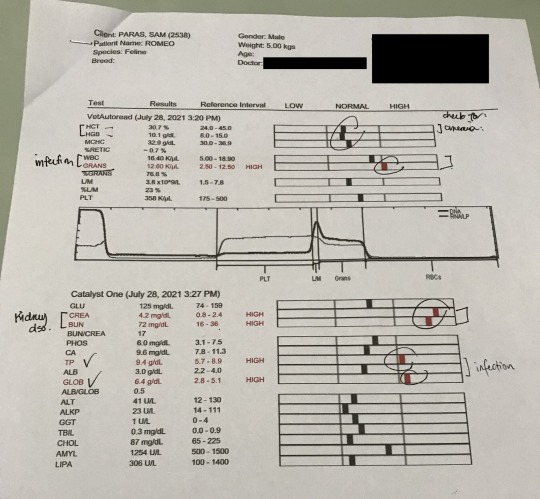
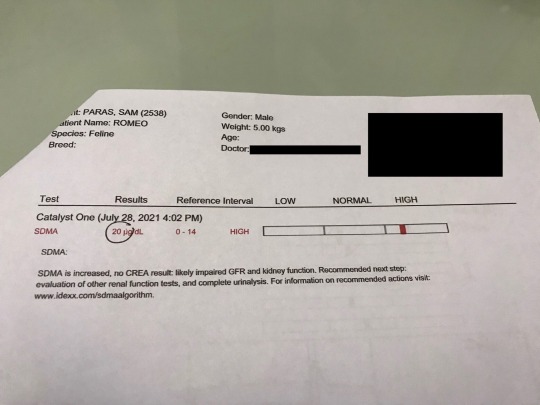
I thought we were just about ready to go and I was just waiting for the print out of all the lab results and for the vet to write up the prescriptions when I was asked to go back into the exam room.
What I saw was hella terrifying. Romeo was hooked up to this machine and there were so many cables. I thought he had crashed and was dying! Turns out he was just having his blood pressure measured. The band that went around his arm was so tiny. He seemed so fragile in that moment. His BP was high at first, but the second time it was normal. Could have been just the stress of being at the vet. But there’s also a possibility of it being comorbid with the kidney disease.
He was prescribed nefrotec tablet to be taken 3x a day. It’s supposed to make him pee more to help him get rid of body waste. His kidneys aren’t functioning properly and so the waste builds up in his blood instead. He absolutely refused to take them when I gave them by hand. So I got a pill inserter to help. It worked the first time... and only the first time. Now I crush the tablet and cover it up with tons of yummy wet ciao treat and now he goes bananas for medicine time.
He’s also taking antibiotics for his bum wound. He’s a champ at taking it directly by oral syringe. He also doesn’t make too much of a fuss when I clean and apply ointment to his bum. He can take off the velcro e-collar within two minutes of me putting it on him. So I got a different collar that is secured by buttons. It’s better at preventing him from taking it off, but he still did manage to slip out of it once by wedging himself into a tight space, getting the cone stuck, and then backing out of the cone. I only make him wear it about 30 mins after wound treatment to give it a chance to dry. It’s almost completely healed now.
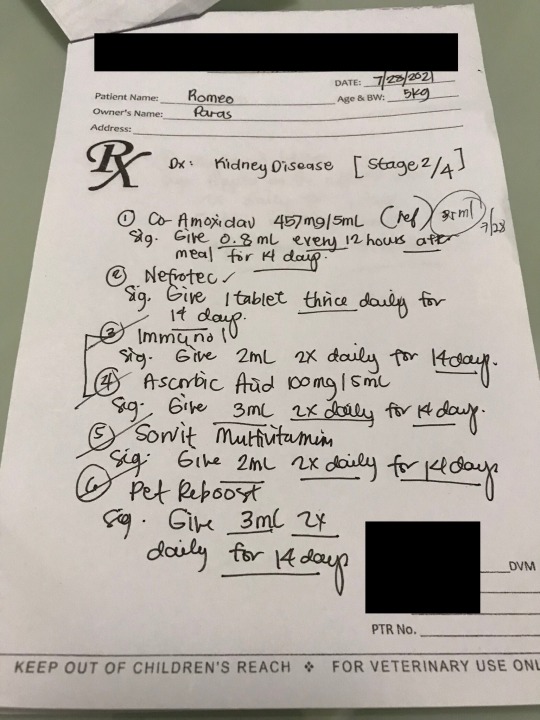
I spent that whole first night after the vet visit reading up on CKD (chronic kidney disease). I looked up the official guidelines and his levels actually indicate stage 3 kidney disease. Moderately impaired renal function. Not quite kidney failure but way too fucking close to that for my liking.
The vet didn’t mention making dietary changes and/or a urinalysis. And she said I had to take Romeo back a week after for retesting to monitor his levels. But that seems like way too soon especially when his meds were prescribed for 14 days.
The SDMA test is also really fucking expensive. It’s Php 1,500. The full blood chemistry panel was Php 2,400. Because we had both done, there was a discount and both tests were Php 3,500. For the retesting though, Romeo would need the SDMA test again and only two components for the blood chem, CREA and BUN, which are Php 350 each. I also think he should get his phosphorus level checked, but the vet didn’t mention it.
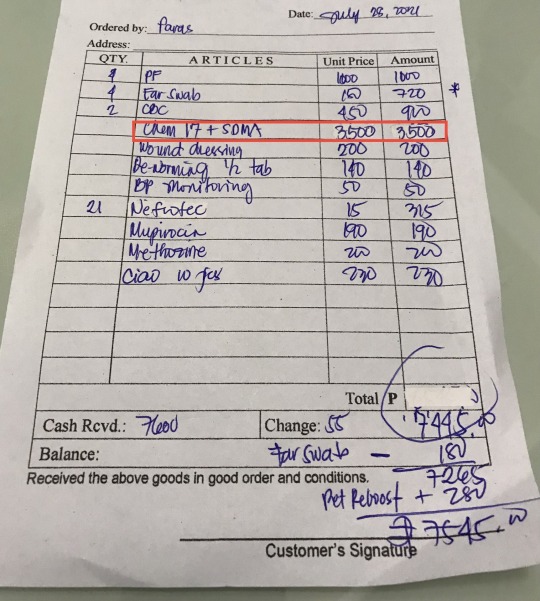
I’m worried about his belly being a bit large. He’s got a visible waist still, so I don’t know if that’s just his primordial pouch or if he’s got some swelling or fluid buildup on the inside. I might take him to the full animal hospital to get an ultrasound/x-ray and a urinalysis. Our regular vet doesn’t have an ultrasound/x-ray machine.
What’s stressing me out a lot is not being able to feed him a specially formulated renal diet which is supposed to slow the progression of CKD. They’re just way too expensive. There’s also just not a lot of options here. There’s only hill’s and royal canin. We’re just going to have to make do with Special Cat Urinary which has okay ingredients and a phosphorus content that’s lower than other non-prescription cat food. Not as low as what our goal should be, but it should still help his kidneys a bit. It’s Php 1,200 for a 7kg bag compared to our usual food that’s only Php 870 per 7kg. I’m not sure if I should be feeding it to the other cats as well. The ingredients are actually better than our current dry food. The protein content is actually higher and the first ingredient is chicken instead of cereals.
I still wonder if there would be any benefit to doing the expensive renal diet even if for two weeks just to get his levels under control.
I’m feeding Romeo more wet food now and less kibbles so he can get more moisture. Given the choice, he prefers dry food, but that’s not doing him any good so I’m limiting his dry food intake. He’s also much more energetic. I’m really scared about what his levels would be when we do retest. But we’re just taking it day by day right now.
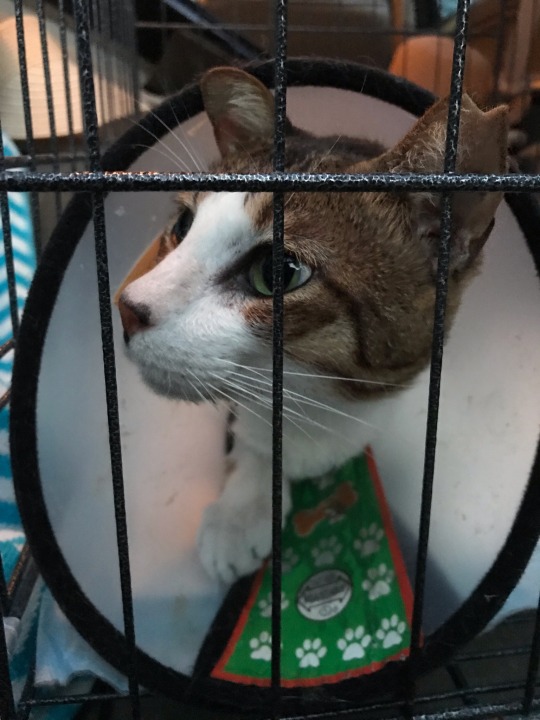
See his paw in the cone. This was taken in the car at the end of our vet visit. We hadn’t even left for home yet and he was already working on his escape. 😂
#cats#kitty#cat#rescue#animals#stray cats#rescue cats#stray animals#rescue animals#Romeo#2021#august 4#kidney disease#ckd#ckd in cats
7 notes
·
View notes
Text
August 7, 2021 was supposed the end of a very hectic first week of August.
August 3, is my oldest daughter’s birthday. August 4, is my grandson’s birthday.
August 5, 2018 my father passed away from MPGN. It is a rare auto immune kidney disease.
August 6, is my birthday. So, when my younger daughter didn’t call me on my birthday and then texted me on the 7th at 1:30 with the cryptic message of “I hope you and dad are having a good day. I love you.” I knew something was wrong. This was out of the norm for her. She would normally tell me what her and our grandson were doing for the day.
When I asked her if everything was ok her reply was, “just having an emotional day.”
I asked my husband if he had heard from her. He said no. I explain my cryptic message. He thought it wasn’t out of the ordinary.
A mom’s intuition is NEVER wrong.
The day went on with texts about hiding from the cops. Promises to call me, etc.
At 11:47 her ex-fiancé called us to say he had found her in her apartment. Our daughter had tried to KILL herself.
She had taken 2 bottles of pills and cut her arms. He found her in the bathroom.
She had written her son several versions of a goodbye letter. The text she sent me was my “goodbye”.
She sent her ex one at the same time.
I SCREAMED at her. I told her to go to the ER now.
In the past 3 years I lost my dad, aunt, my grandma, survived Covid, wasn’t able to drive for 6 months, and then had my child try to kill herself. All I have left in this world are my husband, 2 daughters, and 2 grandkids.
She was involuntary committed the next morning. She spent 1 1/2 weeks in the hospital. I was there when she walked out the doors. She then spent 1 month with us recovering.
The road to recovery isn’t over yet. She has several diagnoses. We are working as a team to keep her safe and alive.
Know your loved ones. Know the signs of depression. Be persistent. Be intrusive.
We call is “radio silence”. Our daughter would not return texts or phone calls for days… she would sleep for 50 hours at a time.
Watch spending habits. If your loved one is throwing money at friends and family; speak up.
Above all else; love them and don’t let go.

1 note
·
View note
Note
hi! i hope you don't mind another cat advice question? mine was unfortunately just diagnosed with chronic kidney disease at a young age. i see so much conflicting advice about what to do. my understanding is one of your cats has this too? i don't suppose you would be willing to share what you do for them, or any resources or what you wish you had known from the start? thanks so much either way!
TW for pet death mention.
There IS a lot of conflicting information about it, especially around prescription foods. There's a lot of anger toward prescription food companies. There's a lot of fake promises by other companies. There's a lot of anecdotal evidence.
When Smooch was diagnosed I looked into all of it, and wound up like this:

So I walked right back out with my stack of pizzas and did exactly what my vet told me to do.
The thing I wish I'd known from the start is just how on my side the vets at my clinic were going to be!
It is NOT true that vets are shills for Science Diet and Hills. Vets are VERY educated on nutrition, based on empirical evidence. People in pet stores hard selling you on special diets and telling you your Hills KD is killing your cat are not. People on the internet who have read tons of information put out by these other food companies, or by fringe pet health companies, are not. You or I are not. You can't do this alone, you need someone you can trust. Your vet is going to have to be that person.
So my advice is to do what your vet tells you. Ask questions, do research, yes, if you feel you need to understand WHY your vet is saying what they are saying. But your vet IS the expert you need. And they would ALL rather you came to them with annoying questions over and over than listen to someone on the internet with a hate-on for Hills and SD and their own food/supplement/book to sell.
It may take a while to get your cat set up with a food formula they like. Keep trying.
Talk about treats. There are kidney safe treats you can get. I very rarely give Smooch non-approved treats, but he does get four or five catnip treats every couple of weeks. Work out something that is safe and stick to it like glue. Never go over what is safe.
Discuss in detail warning signs that your cat may need to come in. Learn how to spot dehydration. Know how long your vet wants you to wait if the cat won't eat before calling for help. Cats with CKD can spend a lot of time nauseated, and may vomit frequently. Small meals can help, and there are meds to both fight nausea and stimulate appetite. Keeping weight on a CKD cat is critical. It is your buffer, it buys you time when they're in one of those little downward swings that they DO all eventually have. Smooch has had 2 little ones. He's bounced back both times.
Openly discuss prognosis. Initiate this conversation yourself. The answer will probably be "there's no way to tell right now how long they have," but if it isn't, you do want to know that, however painful. Ask "how long do cats diagnosed at this stage and at this AGE usually live", and "what mistakes do you see people make in caring for their CKD cats". (You can google the first if you are willing to crunch numbers. I am proud to say that Mr. Stinkman is well over 6 months past his expiry date and doing well.) It wasn't CKD, but being told that my last cat was going to die of heart disease and probably had only a year or two left was a gift. It allowed me to cherish the time, to make my peace, and made it easier (not easy, but easy-ER) to make the eventual call. So be direct in discussing this, if you can. It will make future conversations about it easier. Let the vet know you WANT to be told when things are looking grim. No surprises. CKD will require a lot of communication and honesty between you and the vet.
Take them in for all routine bloodwork on time.
Clean water in multiple locations is absolutely necessary.
Have a vet show you how to pill your cat. You will need to know. Some cats can be pilled by hand. Some need a pill shooter. Always be gentle, never angry.
You may need to learn to give subcutaneous fluids. This actually isn't as scary as it sounds once you get used to it (unless you are phobic of needles, in which case you have my complete sympathy). If you give fluids, keep a record of when and how much. Ask your vet to teach you when to give them. If your cat seems to be feeling punky, you can call the vet and ask if you should bring them in or give them fluids and see if that helps. Buy your solution from a pharmacy, not the vet, it's way cheaper. Buy your IV kits and syringes online. Get the vet to help you pick out the right thing if you aren't sure about it. If this becomes a regular thing, don't just throw your needles away, get a sharps bin. The price if you order online includes return shipping and disposal. It keeps sanitation workers safe.
Know where your nearest emergency vet is, know how to find it at night, have their number ready in your phone. This is good for all pet owners.
Never lie to make yourself look good, even if you have been a complete dumbass. Always be truthful and give complete information.
Here are some true things that may help cheer you up:
Diagnosis is the best thing that could have happened because now your cat can be cared for!
Many people don't stick to their vet's advice. This drags down average survival times. I personally believe it does so significantly (based on what I have read from vets and techs, on conversations with them, and on knowing how difficult humans are about pet care). By following your vet's advice, you are most likely going to wind up on the generous side of the survival rate.
Most of your cat's time is going to be spent feeling just fine.
My final advice is for every cat owner reading this. Record your cat's purr. Do it today. No fancy equipment, just a recording app or your video camera on your phone, leaned up against your cat's side or held under their chin. For as long as they will tolerate it. Save the clearly labeled file in multiple places, upload it to Youtube privately, just make sure you don't lose it. You will be so glad you did.
I am very hopeful for your kitty, and I wish you both the best. CKD is so common and very unfortunate, but it also gets us closer to our cats and our vets, and it can be rewarding, in a strange way, to care for a chronically ill animal. To know you are doing your very best.
62 notes
·
View notes
Text
Okay so here’s a pretty detailed account of what’s been going on with me medically and why I haven’t been around all that much.
Under the cut. Don’t re//blo/g this please. Warnings for weight gain and loss, serious medical stuff, and emetophobia. I’m not attaching any pictures of the medical stuff, but I have them and they’re pretty gnarly.
Don’t feel like reading this but still want to know what happened? TL;DR, acute renal failure.
I haven’t been feeling well for a while (months), but kind of figured it was just whatever and probably related to job stress. I didn’t pick up on the signs (weight gain, some other stuff) and I figured it was just due to unhealthy habits which I would deal with eventually, which weren’t top priority due to the pandemic and things.
Well, I started to feel really bad, but figured I had a sinus infection, which I seem to be somewhat prone to. I had one around this time last year. I took some antibiotics, and things went downhill FAST. As in, I started vomiting, gained twenty pounds in about ten days, and other things such as that.
I did see the doctor, who directed me to a nephrologist. Before I could see the nephrologist I went to the ER, where they didn’t really help. Saw the nephrologist, he didn’t take me seriously, and I ended up in the ER again that night. I was admitted to the hospital proper the next day after spending the night in the waiting room.
I was alone in the hospital (no visitors) for a few days, before my mom was allowed to stay with me. By this point it was pretty clear that my kidneys were not doing what they were supposed to do, (functioning at about 20% capacity iirc) and I needed a biopsy to show what exactly the problem was. Another issue: treatment couldn’t start properly until I HAD the biopsy, and it took days to get it on the schedule. So things got worse. I ended up hallucinating (which was really scary) and I don’t remember every day, but things got...strange. My kidney numbers were not good. I actually had to have dialysis three times, which was even less fun while hallucinating, and apparently they took about 2 ½ milk jugs worth of fluid out of my blood.
Apparently at one point I was having some weird heart stuff due to too much potassium buildup in my system but I don’t remember that.
Biopsy results revealed Minimal Change Disease, which must have been building for months (it is WAY worse than it sounds) with a trigger from the antibiotic and one of my other medications. I was transferred to a different hospital. Total hospital time was 2 weeks, then I could finally go home.
Now I’m recovering but I’m on some really difficult medications (15 pills a day!) that make it difficult to use screens (phone is much easier than computer) or type. I have lost 35 lbs (mostly excess fluid that my kidneys couldn’t handle before treatment) since the peak of the illness about a month ago. I still feel like garbage, but I am making a lot of progress in the right direction.
I think I had some other stuff to share, but this is a LOT of typing for me right now and it’s the general idea.
So yeah...that’s why I haven’t been around that much. Acute renal failure.
18 notes
·
View notes